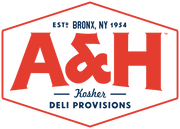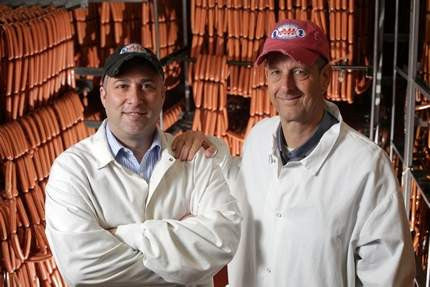
Seth Leavitt is banking on grilling weather for Passover.
However, a little rain will not slow his business down.
“Growth has been steady and rapid,” he said.
As CEO of Abeles & Heymann in Hillside, a manufacturer of gourmet Glatt Kosher beef products, Leavitt has set the company on an upward trajectory since purchasing it from the founding family in 1997.
For example, he saw more than a tenfold increase in sales after moving the business from New York to its state-of-the-art facility in Hillside in 2006.
And he has seen more than 50 percent growth since partnering with Maadany Yehiam, the Israeli manufacturer of the Hod Golan line of poultry products, in 2012.
Now, while maintaining the founding family’s standards for quality and authenticity using old world recipes, Leavitt and his partner, Micha Rakaby, president of Hod Golan, are on a mission to break out of the Glatt Kosher market.
“We want to reach consumers who are simply looking for cleaner, healthier labels, even if they do not need to eat Kosher,” Leavitt said.
With a trend toward healthier options, Abeles & Heymann has redesigned its packaging and manufactures the only available uncured, reduced-fat, low-sodium, no-nitrates-added hot dogs.
“We simply believe Kosher beef is better beef,” Leavitt said. “That is not something everyone can say and do, so, we have that advantage.”
Maadany Yehiam
Founded in 1969, Maadaney Yehiam, the Israeli manufacturer of the Hod Golan line of poultry products, is neither privately nor publicly owned.
“It is owned by the agricultural collective Kibbutz Yehiam, founded in 1946 in the Western Galilee,” Micha Rakaby, president of Hod Golan, said.
“Kibbutz” means group in Hebrew. And for nearly 3 percent of the Israeli population, it means living and working within a voluntary, self-sustaining, economically and socially secure society founded on the principles of communal ownership and equality.
Members of a traditional Kibbutz typically pool their income in order to run the community, make investments and guarantee mutual aid and responsibility between members.
Maadaney Yehiam was founded in 1969 as the manufacturing branch of Kibbutz Yehiam.
Leavitt would know. He’s spent his entire career in Kosher. That’s how he knew Abeles & Heymann meant quality.
Oscar Abeles and his nephew, Leopold Heymann, founded Abeles & Heymann as a storefront in Washington Heights, New York, in 1954 before relocating to a 2,500-square-foot facility in the Bronx.
Leavitt and his then-partner, David Flamholz, purchased Abeles & Heymann in 1997.
“Leopold Heymann stayed on with us for more than a year afterward, teaching us how to run the business and manufacture the product properly,” Leavitt said. “We have since stayed true to his vision.”
A few small things did have to change.
After outgrowing the small, antiquated factory and outsourcing manufacturing for several years, Abeles & Heymann began to outgrow its co-packer.
“That’s when we decided that, in order for us to get to the next level, we had to build our own manufacturing facility,” Leavitt said.
That led Abeles & Heymann to its more than 18,000-square-foot facility in New Jersey, and into major club stores, supermarket chains and trade shows such as Kosher Fest at the Meadowlands Expo Center — where Leavitt met Rakaby more than five years ago.
“Micha approached me about private label at the time, but I was looking for a more active partner in the business,” Leavitt said.
As one of the largest manufacturers of deli provisions in Western Galilee, Israel, Maadany Yehiam and its more than 200 employees held more than 60 percent of the market share while exporting to the Kosher, Glatt Kosher and Halal markets in Europe, the United States and Canada.
Biz in brief:
COMPANY: Abeles & Heymann
EXECUTIVE: Seth Leavitt, CEO
HEADQUARTERS: Hillside
FOUNDED: 1954
REVENUE: Between $5 million and $10 million
EMPLOYEES: Nearly 30
“There was a lot of synergy,” Rakaby said. “We brought poultry — Abeles & Heymann does beef.”
“It was a great opportunity to partner with someone who had a lot more experience than I” Leavitt said.
That has helped Abeles & Heymann in its quest to create healthier products. It also has encouraged Abeles & Heymann to redesign its packaging and logo to emphasize Kosher — but not too much.
“We want to emphasize Kosher, but not so much Glatt Kosher, as that can be confusing for customers,” Rakaby said.
Currently, the New Jersey and New York Glatt Kosher market makes up nearly 60 percent of Abeles & Heymann’s business.
“We are a leader in Orthodox Jewish communities in Bergen County, Livingston, West Orange, Lakewood and in Florida, California and Illinois,” Leavitt said. “Now, we want to branch out.”
Their biggest challenge, both Leavitt and Rakaby said, is to become as beloved a brand to non-Kosher consumers as they are to Glatt Kosher consumers.
“I look at it very simplistically,” Leavitt said. “Batman has Superman. Coke has Pepsi. Who does Hebrew National have? ... There is so much opportunity out there for us to make our mark.”
Leavitt said that, while it may take up to a year to do so, it will happen.
“We are growing; we are getting our name out; we’ve proven that we produce good products and can maintain large orders for big box stores,” he said. “We know there is the opportunity for us to cross over into non-Kosher segments.”

